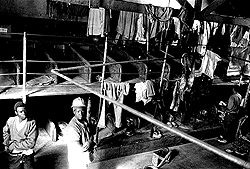Life changed for Peter Magubane one day in 1954 when he picked up Drum, a South African magazine known for its reporting of the brutality behind apartheid. “They were dealing with social issues that affected black people in South Africa. I wanted to be part of that magazine,” says the now-65-year-old photographer.
 After six months of doing odd jobs for Drum, the young Magubane was given his first photography assignment. “After that I never went back. It was the beginning of good things.”
After six months of doing odd jobs for Drum, the young Magubane was given his first photography assignment. “After that I never went back. It was the beginning of good things.”
He went on to document the reality of life under apartheid with wrenching photos of seminal events in his country’s history, including the Soweto uprising in 1976 and the Sharpeville massacre of 1960. While the subjects of the photographs took to the streets, Magubane says, “I was demonstrating with my camera. I had to use it to show the South African people and the world what was going on in our country.”
Magubane’s work eventually earned him the honor of being the first black South African to win a photography prize in his country. But his photos didn’t earn him any favors from the South African police, from whom he occasionally had to hide his camera in a hollow loaf of bread or a hastily emptied milk carton — while still taking photographs. “You had to think very fast,” he says. “You had to be one up on apartheid.”
Though never convicted of a crime, Magubane endured a total of 586 days in solitary confinement, six more months in jail, occasional torture, and five years of “banning” (essentially, a total prohibition against social interaction and meaningful work).
The photojournalist now records life in post-apartheid South Africa for Time magazine, and has published 11 books. His next, The Vanishing Cultures (Cape Town: Struik Publishers), is a collection of photographs of 11 rural South African tribes and is due out in September.
“There have always been many stories, not just apartheid stories,” he says of his love of traditional South African culture. “This country is not made of violence only.”
This June, Peter Magubane will receive the 1997 Leica Lifetime Achievement Award, given jointly by the Mother Jones International Fund for Documentary Photography and the Leica Camera Group.









